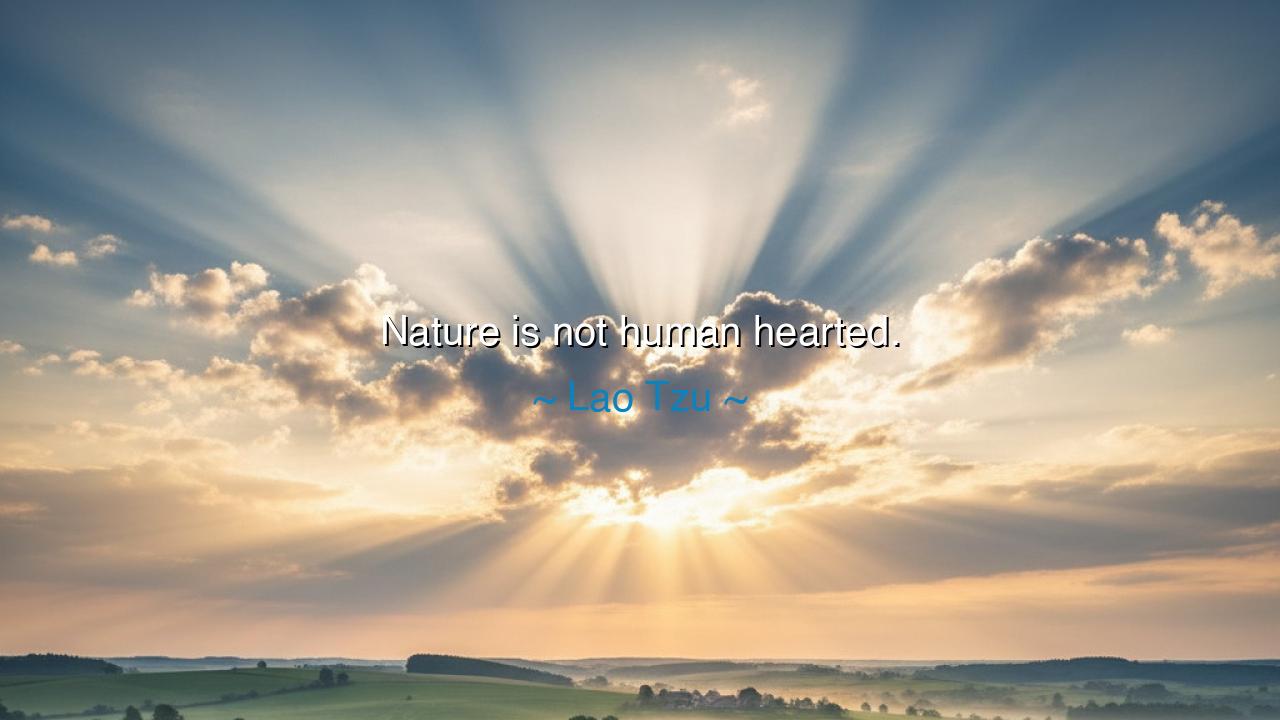
Nature is not human hearted.






Hear the solemn wisdom of Lao Tzu, sage of the Tao, who spoke with the voice of rivers and mountains: “Nature is not human-hearted.” In these few words he revealed a truth that men have long resisted—that the order of the cosmos does not bend to the measures of sentiment, nor to the desires of mortals. Nature is vast, eternal, and impartial. The storms do not rage because they hate; the sun does not shine because it loves. The flood drowns both the righteous and the wicked, and the harvest feeds both the noble and the base. In this, Lao Tzu bids us see that life is not governed by the passions of men but by the rhythms of the eternal Tao.
The meaning is not cruelty, but clarity. To say that Nature is not human-hearted is to remind us that the universe does not think in terms of favoritism, vengeance, or pity. A mountain does not move aside for the weary traveler; the fire does not spare the innocent hand. Yet in this impartiality there is a deeper justice, for Nature treats all as it treats all—without bias, without corruption, without deceit. What seems harsh to the heart of man is in truth the unshakable balance of existence.
Consider the tale of Pompeii, the city at the foot of Vesuvius. Its people lived in wealth and beauty, their streets adorned with art, their villas with splendor. Yet when the mountain spoke with fire, none were spared. The noble and the servant alike were covered in ash. Was this hatred? Was this vengeance? No—it was simply the impartial law of Nature, which moves without reference to human desire. In the ruin of Pompeii, we see not cruelty, but the reminder that life is fragile, and that the earth belongs not to us, but we to it.
Or recall the voyage of the great ship Titanic, which men called unsinkable. With pride they proclaimed mastery over ocean and ice. Yet the sea, in its vastness, cared nothing for pride. The iceberg struck, and mighty engines failed, and the ship descended into the deep. It was not hatred in the sea, but indifference; not vengeance in the ice, but the quiet law that what is fragile cannot endure what it defies. Thus the ocean taught humanity once more that Nature is not swayed by arrogance, nor softened by hope.
But in this impartiality lies not despair, but wisdom. For if Nature is not human-hearted, then man must learn humility, patience, and reverence. He must cease demanding that the world cater to his desires, and instead walk in harmony with its order. The farmer does not command the rains; he plants in season, prays for balance, and accepts the mystery of harvest. The sailor does not command the sea; he studies its currents, bows before its power, and finds his path within its might. So too must each of us learn to live in rhythm with the Tao, not in rebellion against it.
O children of tomorrow, let this lesson be your guide: do not curse the storm, but learn to build shelter. Do not despise the fire, but learn to use its light and warmth. Do not rage against death, but honor life while it is yours. For Nature is not human-hearted—but it is steadfast, and those who walk with its rhythm shall find peace. To resist is to break; to yield is to endure.
Therefore, practice reverence daily. Walk upon the earth lightly, remembering it owes you nothing. Guard the rivers, the forests, and the skies, for though they are indifferent to your survival, your survival depends on them. Let go of the pride that demands special favor, and take up the humility that seeks harmony. For only in harmony with what is eternal shall the fleeting life of man find its true strength.
Thus Lao Tzu’s words endure: “Nature is not human-hearted.” Take them not as sorrow, but as wisdom. The heavens and the earth will not change for you; therefore, change yourself to walk with them. In this lies the path of peace, the secret of endurance, and the gateway to wisdom eternal.






AAdministratorAdministrator
Welcome, honored guests. Please leave a comment, we will respond soon